NAR’s Chief Economist Criticizes the Federal Reserve’s Actions
During the Residential Economic Issues and Trends Forum at the Realtors Legislative Meetings, Lawrence Yun, the Chief Economist of the National Association of Realtors (NAR), expressed his disagreement with the Federal Reserve’s recent decision to raise interest rates in an attempt to control inflation. Yun began his highly anticipated presentation on housing market trends by stating, “They should not have done that,” referring to the interest rate increase. He pointed out that the current inflation rate stands at 5 percent, which, although not yet at the desired 2 percent level, is an improvement compared to the peak of 9 percent observed last summer.
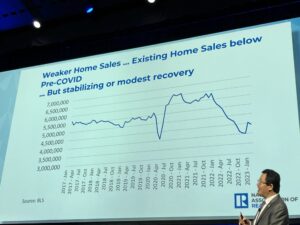
Yun highlighted the role of rental rates as a significant contributor to inflation. Despite the 5 percent inflation rate, he predicted that rents would decrease due to the substantial construction of apartments, which is currently at a 40-year high. Based on this analysis, Yun concluded that the Federal Reserve made a mistake by raising interest rates.
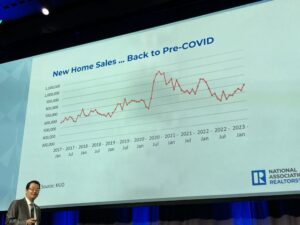
In terms of home sales, Yun noted that existing-home sales are currently lower than their pre-COVID levels but appear to be stabilizing. He emphasized the importance of stopping the decline in sales before seeing any significant improvements. On the other hand, new-home sales have returned to their pre-COVID levels, mainly due to higher inventory compared to previous years. Existing-home inventory is currently approximately 40 percent lower than in 2019, which, according to Yun, suggests that there won’t be a collapse in home prices. He stated that 60 percent of listings sell within a month, and 28 percent attract multiple offers, indicating positive trends in the housing market.
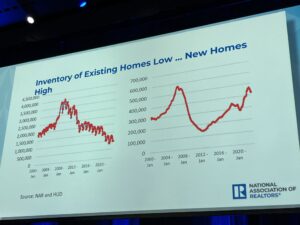
Yun also discussed the influence of demographics on housing demand. He explained that as the population grows and various life events trigger home sales, the demand for housing will continue to rise. To emphasize his point, he humorously predicted that divorce rates would decrease in 2022 because people would prioritize their 3 percent mortgage rates over dissatisfaction with their spouses, eliciting laughter from the audience. He further forecasted that total home sales would reach a low point this year but gradually increase in the following year due to declining mortgage rates and sustained job growth.
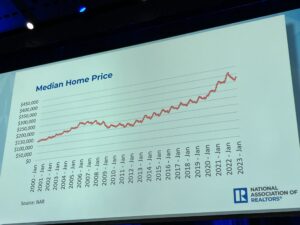
During the same forum, Robert Dietz, the Chief Economist for the National Association of Home Builders (NAHB), addressed the need for increased housing unit construction to alleviate inventory shortages and reduce inflation. Dietz emphasized the importance of constructing affordable housing to address the inflation issue effectively. He identified various obstacles to homebuilding, including the high cost of building materials due to supply chain challenges, regulatory burdens that significantly add to home prices in expensive markets like California, and a shortage of approximately 100,000 workers in the industry. Dietz predicted that the long-term labor shortage would persist and stated that the construction of more than 1.1 million single-family homes annually would be necessary to meaningfully address the inventory shortage. The NAHB does not anticipate this figure to exceed 1 million until 2025.
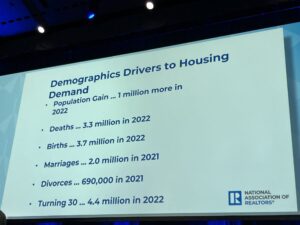
#RealEstateTrends #HousingMarket #FederalReserve #InterestRates #Inflation #HomeSales #InventoryShortage #AffordableHousing #RentalRates #Demographics #JobGrowth #MortgageRates #SupplyChainIssues #LaborShortage #HomeBuilders #NAR #NAHB





